Total UK PE deal volumes increased through 2024, up 4.4 percent versus 2023. Total deal value was up nearly 12 percent. With the majority of deal activity occurring in the second half of 2024, the data suggests deal volumes and values are starting to rise after a difficult 2023.
Half yearly UK PE deal flow
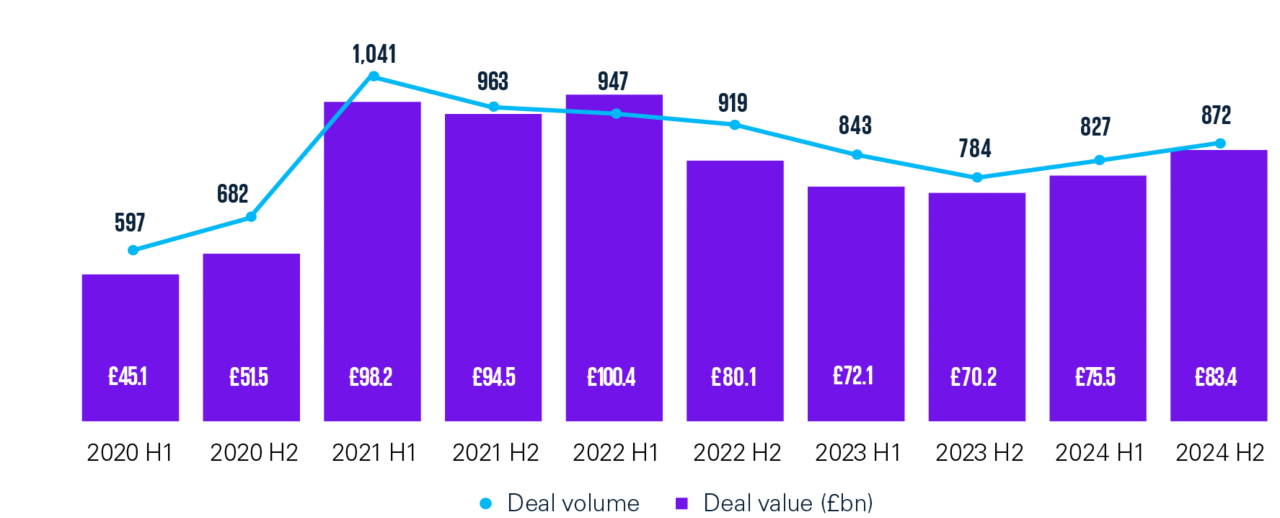
"Many of the challenges that slowed market activity in 2023 are now improving, and there is now more confidence within both large-cap and mid-cap PE investors to get deals done."
Naveen Sharma, UK Head of Private Equity,
KPMG LLP
In part, the uptick in the second half can be attributed to a more stable economic climate with interest rates and inflation falling, debt markets loosening and business confidence increasing. It likely also reflects a more certain political environment with elections in the UK, the US and EU now settled.
Will changes to the inheritance tax drive new activity?
The Autumn Budget contained substantive changes to the inheritance tax with the existing 100 percent relief for agricultural and business property applying to only the first £1 million starting in 2026. The remaining value would be subject to 50 percent relief.
While there has been significant discussion in the press about the impact on UK farmers, less has been said about the impact of the changes for those leaving a business to a next of kin. Those business founders now thinking about retirement will likely want to consider the merits of transferring the business ahead of the changes. And that could drive significant exit activity as older founders accelerate their retirement plans.
For more on the impact of the UK Autumn Budget, check out this report by KPMG.
Sectors
While Business Services led the deal markets, TMT saw the greatest growth in terms of volume.
Business services dominated the PE deal market, representing 43 percent of the total deals made in 2024, up more than 10 percent over the previous year. Professional services businesses, in particular those with a clear contracted base of recurring revenue, were particularly attractive in 2024.
TMT emerged as the hottest sector through 2024. Deal volumes were up nearly 19 percent year-on-year and cumulative values were up nearly 58 percent, capturing more than £40 billion in total deal value. The Consumer Goods and Retail (CG&R) sector also showed signs of a comeback with volumes up 5.3 percent and values up 21 percent.
Yet those anticipating a broad-based rebound in 2024 were likely disappointed. Dealmakers stayed on the sidelines in the Financial Services sector where volume sagged nearly 15 percent year-on-year. Energy and Industrials experienced similar volume declines, likely the result of continued uncertainty around trade and energy policies.
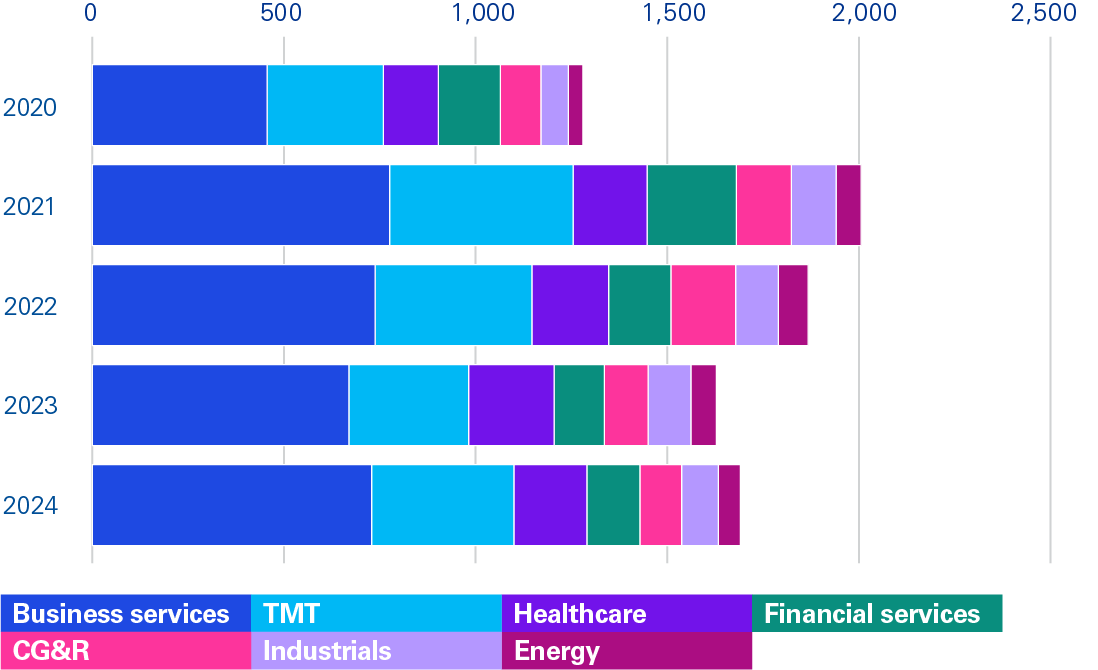 UK mid-market deal volumes by sector
UK mid-market deal volumes by sector
Are generalist funds a thing of the past?
KPMG’s view suggests that funds are becoming increasingly sector and sub-sector focused as they strive to position themselves as thematic investors that can capitalise on niche markets and speciality areas.
Increasingly, GPs who need to fundraise must show LPs their differentiation. One way this can be achieved is by demonstrating a deep sub sector based strategy, built on experience and conviction, alongside a tangible plan of how to deploy.
Deal types
Investors gravitated towards bolt-ons and minority stakes as they looked for lower-risk opportunities to deploy capital.
Facing significant market uncertainty regarding new deals in 2024, investors turned inwards to focus on their existing portfolio companies. And buy-and-build strategies were front and centre. Indeed, bolt-on acquisitions made up more than 60 percent of the deals conducted in the year, up more than 9 percent versus 2023.
Data also shows that minority stakes increased in popularity over the year, representing 18 percent of total deals. Secondary buyout deals also saw a rise in 2024, with levels nearing those last seen in 2021 and values up nearly 90 percent over 2023.
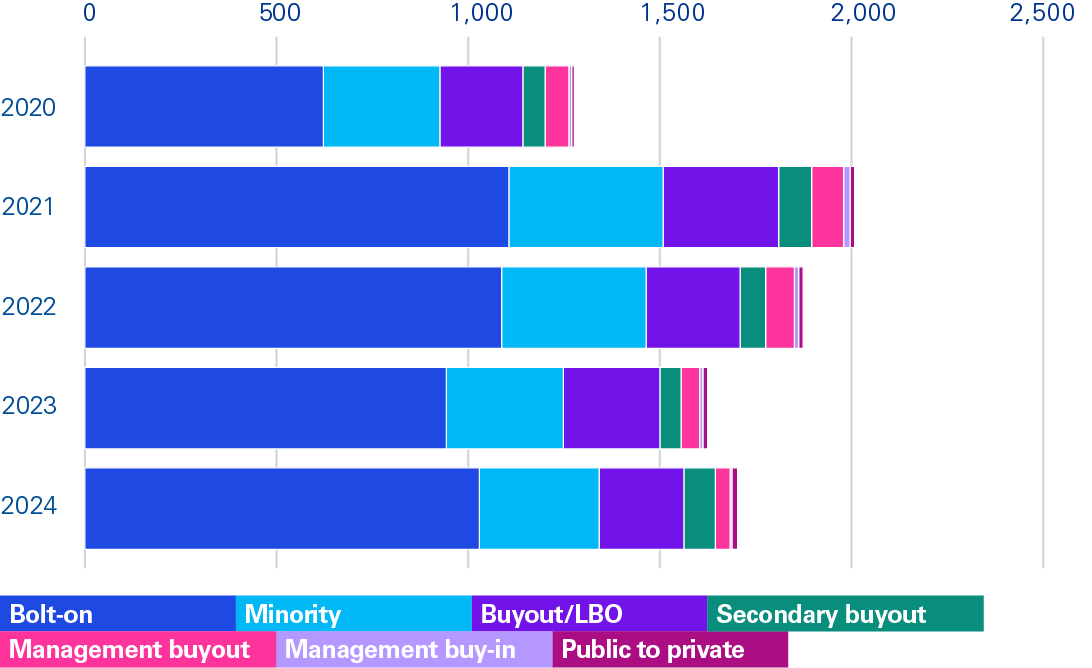 UK mid-market deal volumes by type
UK mid-market deal volumes by type
Some 15 companies were taken private by UK PE over the year. Interestingly, while the volume of take-privates fell by 17 percent, the value of those deals rose a whopping 154 percent, suggesting investor appetite for larger deals of this type.
Hanging on to strong assets: Continuation funds
The past few years have seen a growing trend towards PE houses creating separate vehicles in order to retain valuable assets as funds run down.
KPMG is seeing a greater use of continuation funds, particularly in top quartile performing portfolio businesses, where GPs have been keen to continue the journey of growth alongside a handful of new or existing LPs, while still providing liquidity (and crucially DPI) to all investors in their earlier fund.
Regions
PE leaders looked outside of The City for deals in 2024, leading to rising deal volumes in the North.
While London remains the dominant region in the UK with 44 percent of the total deal count, our data suggests that PE managers went North to build relationships and find good deals. Scotland saw volumes rise more than 20 percent year-on-year, while cumulative values jumped more than 35 percent. In the North West, volumes were up 23 percent and values rose 41 percent.
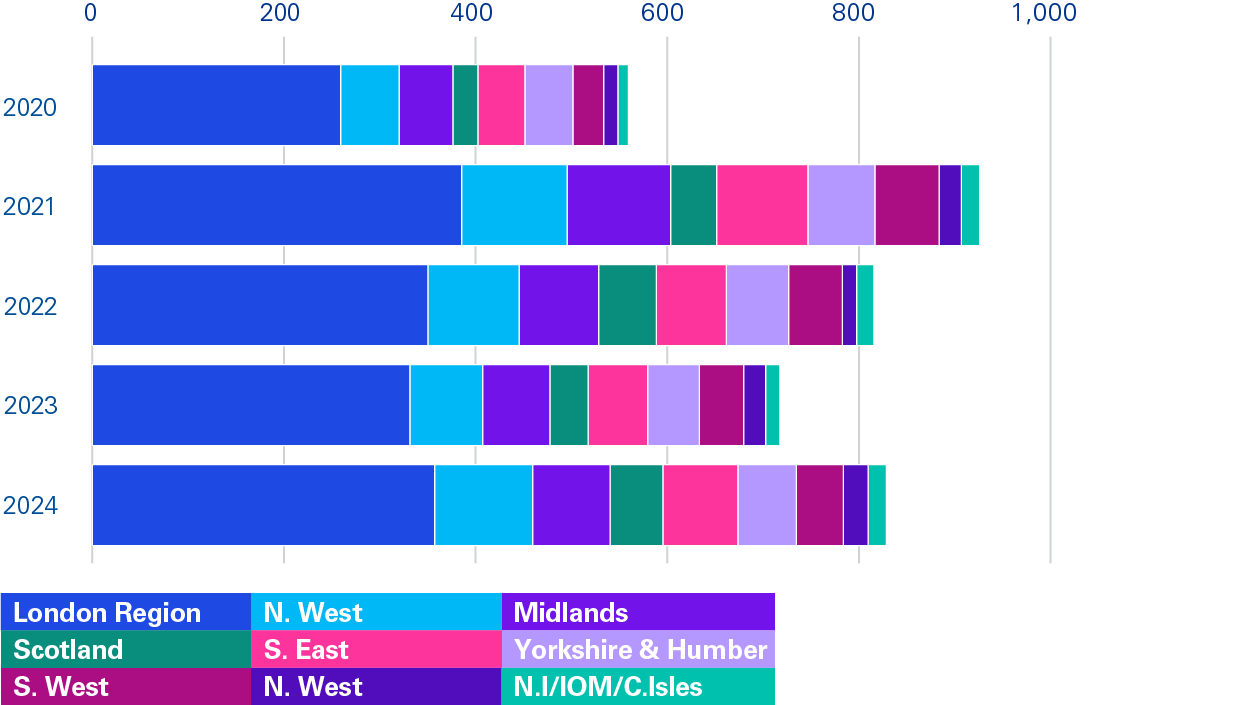 UK mid-market deal volumes by UK region
UK mid-market deal volumes by UK region
Direction of travel on capital gains taxes drives activity
Concerns around the potential changes to Capital Gains Tax rates in the October Budget led many entrepreneurs to de-risk at the end of 2024. We expect this theme to continue as there is still a degree of concern for the future outlook of Capital Gains Tax in the UK.
Activity picked up across most UK regions in 2024. Firms in London struck about the same number of deals as they did in 2023, but at higher values (up 10.5 percent year-on-year). Only the North East and South West experienced drops in activity, while the Midlands saw flat growth.
Exits
Exit activity remained subdued in 2024 as market volatility, geopolitical risk and concerns about the Capital Gains Tax slowed momentum.
PE investors struggled to find the exits in 2024. Exit volumes saw a third straight year of declines, down 3 percent over 2023. Cumulative deal values fell even further, reaching just £46.1 billion – a 20 percent decline over 2023. However, it is worth noting that both volumes and values are up in comparison to the pre-pandemic era.
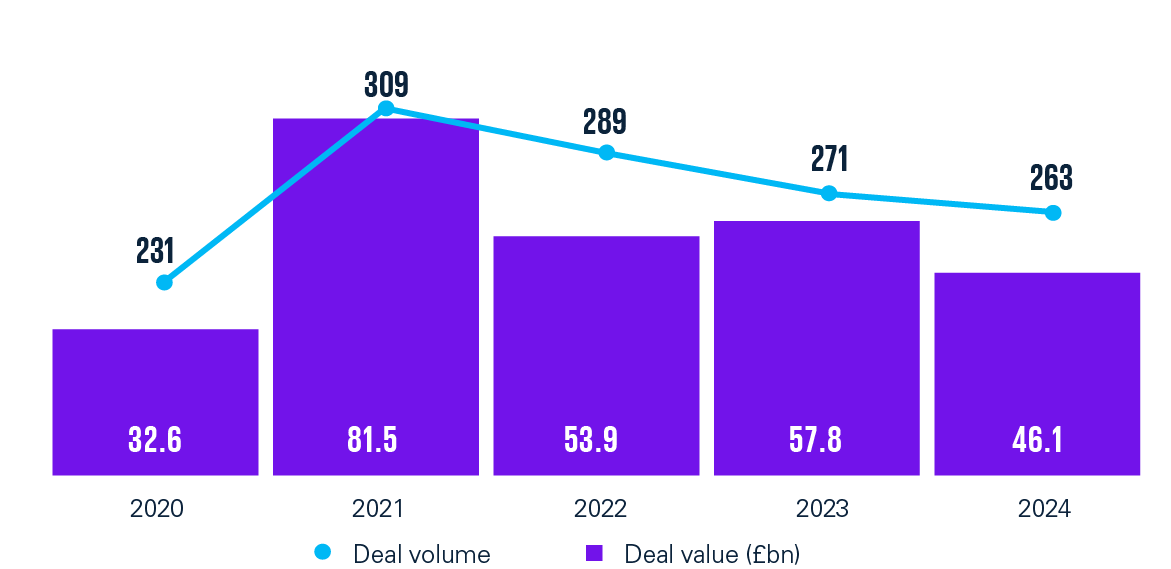
While activity picked up in the second half of the year, average deal values fell in in the first half, suggesting a more active market for smaller deals towards the end of the year. Given the relationship between exits and fundraising, we expect to see UK PE firms start to refocus on exits through 2025.
Might changes to NIC slow exit activity?
The 2024 Autumn Budget increased the rate of employers’ National Insurance Contributions and reduced the threshold at which employer NIC becomes due on employee earnings.
“For labour-intensive businesses in particular, these changes will have had a significant impact on EBITDA. This, in turn, may well push back the exit horizons of some businesses as they look to recover these lost earnings through growth,” suggests Richard Stark, Head of Private Equity in the North, KPMG LLP.
Our advisory insights
Something went wrong
Oops!! Something went wrong, please try again

Get in touch
Discover why organisations across the UK trust KPMG to make the difference and how we can help you to do the same.

